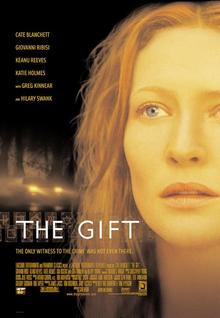Sometimes horror movie therapy doesn’t go the way expected. (No surprises there, so no snarky comments, please. No therapy is “one size fits all.”) This was brought home to me when watching The Gift. I was attracted to the speculative aspect of the premise and although it came out over twenty years ago I hadn’t heard of it before. Although there are speculative elements—at least two ghosts—it is largely a human drama and one that hit me unexpectedly. As a public service for those who also practice horror movie therapy, I thought I’d consider it here. (Then call my regular therapist.) Annie Wilson is a psychic in rural Georgia. She gives readings for donations to help supplement Social Security since she’s a widow and she has three young sons. I don’t know why this didn’t start the warning bells a-jangling, but when it was over I realized her situation was like mine, growing up. (My father was alive, but nobody knew where he was, otherwise I’m on board.)

A violent neighbor, scarily played by Keanu Reeves (forever Neo in my mind), keeps threatening the family since he’s a wife-beater and Annie recommends his wife leave him. Then a woman is murdered and her body is in his pond (or better, bayou). Annie realizes that this threatening bully, who’s convicted of the crime, is actually innocent. Her lawyer, however, doesn’t see the problem—the guy was a menace to society and he’s locked up. Annie, however, insists on finding the truth. I have to say that this movie genuinely scared me. I almost stopped watching. It wasn’t the speculative part, though. It was the human part.
Religious locals accuse Annie of being a witch and a Satan-worshipper. She is, however, simply trying to get by in a society that has failed her. Having an unstable neighbor threatening her kids doesn’t help. What’s so scary is that this isn’t far from real life. For those of us who grew up poor, safety nets are few and the weave is very, very loose. And you’re made, even as a kid, to feel the social stigma of the crime of being poor. Annie has a good heart. She tries to get a man wrongly accused released from jail, knowing that he’ll probably begin threatening her again, if not actually harming her. Society, however, doesn’t really care. Raising three small children on welfare on your own isn’t easy. And, in fact, those kids may well grow up needing therapy. Even if it’s watching horror to try to make sense of life.
